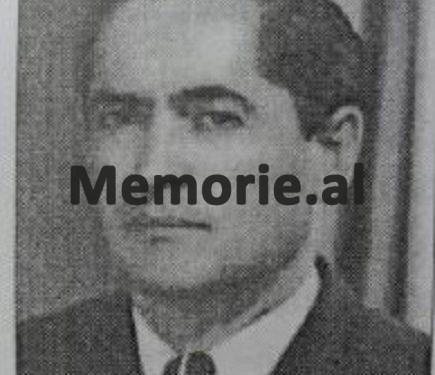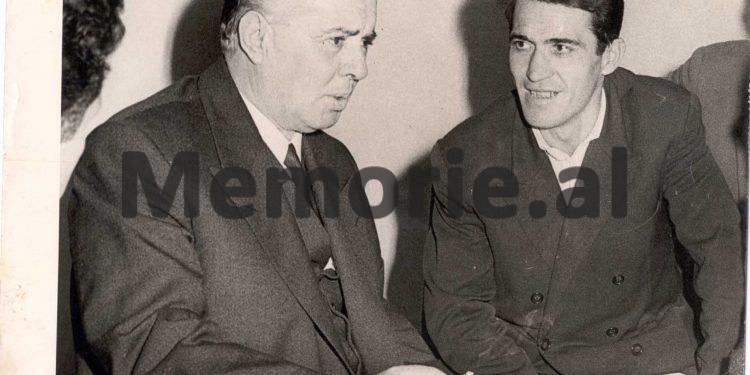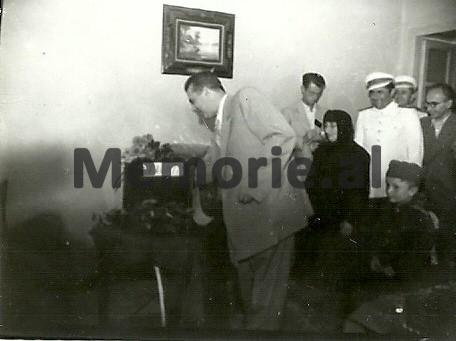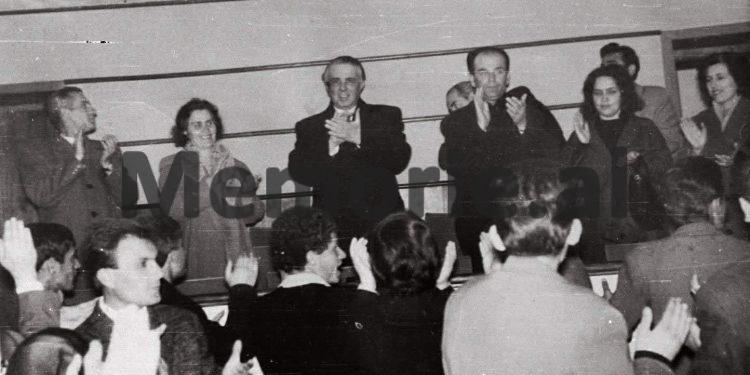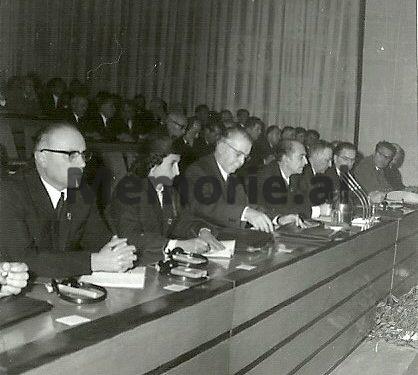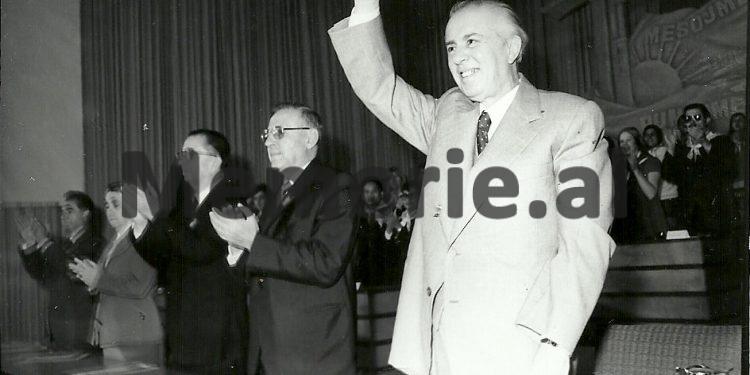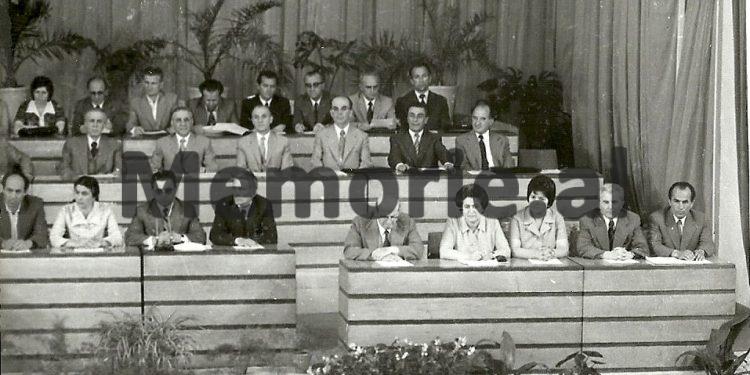Dashnor Kaloçi
Memorie.al publishes the rare testimonies of Pjetër Gjoni, former Chairman of the Executive Committee of the city of Laç and member of the People’s Assembly in several legislatures, who recalled the period of “elections” for the People’s Assembly of the Socialist People’s Republic of Albania, talked about the district of Kruja where he served for years in various tasks and functions. His story about the unknown side of the voting in the period of Enver Hoxha’s communist regime, starting from the selection and appointment of Democratic Front candidates for the People’s Assembly, the conditions and criteria that the candidate had to meet, the orientations from above, working groups with agitators and propagandists, election campaigns, taking measures to write slogans and slogans that would be used, or to refresh the old ones, objectives in the economic field, improving the decorations of cities, voting, “persuasive work” with those who did not want to take part in the voting, the fulfillment of the requirements or the promises for those who risked not going in front of the ballot box on the day of the elections.
“100% participation in voting was the objective and the main problem of our work during the election campaigns. But the district of Kruja, where I worked for many years, has been a big problem and has always been the last. The first to end the voting were: Tepelena, Puka, Skrapari, Mirdita, etc. I remember a case somewhere in the early 1970s when I was a Front delegate in the town of Mamurras. The voting was not closed there 100%, as an elderly woman was missing, who had left her house without being told by the man. It became a big problem and alarm not only in Kruja, but also in Tirana, so much so that the phones rang from “above” every 10 minutes. After many attempts, it was said that the elderly woman was seen in Kruja, going to the village of Noja. After this signal, the President of the Court of Kruja, Qazim Mani, who was delegated in the area where that woman lived, immediately left by car for the village of Noja, located in the highlands of Kruja. When they met the desolate old woman there in the village, she told them that: she had seen a dream”!
This was stated, among others, by Pjetër Gjoni, former member of the People’s Assembly of the Socialist People’s Republic of Albania for several legislatures, chairman of the Executive Committee of the city of Laç of Kurbin and of the Trade Unions of the Kruja district for more than 30 years, recalling the stories of voting for the People’s Assembly in the period before the ’90s, events and stories which, Memorie.al are published for the first time.
Mr. Peter, at the beginning can you tell us: which was the body that had the attributes to set the date of the elections of the deputies for the People’s Assembly?
The date of the elections was set by a decision of the Political Bureau of the Central Committee of the ALP in cooperation with the General Presidency of the Democratic Front of Albania. After that, these two high forums of the Party and the Front appointed the respective delegates who were distributed in all the districts of the country, to organize and control all the problems related to the elections, starting from the campaign, the electoral propaganda, and up to the process of closing the ballot boxes. For all these, the delegates who could be members of the Politburo, such as in Kruja where Manush Myftiu, Spiro Koleka, Simon Stefani, etc. came, were given all the necessary instructions and messages.
What about the appointment of a candidate for deputy in the People’s Assembly by whom?
The nomination of candidates for deputy was done by the district Party Bureau (which was also the highest body in the period between the two conferences of the Party Committee) which always spoke on behalf of the Presidency of the Democratic Front, as the Party led the Front. Based on the number of voters, the areas of deputies were determined. We in the district of Kruja initially had 4 areas, then became 6, 8, and 10 areas.
But from above no instructions were given for any particular candidate?
Definitely given The Politburo and the Presidency of the Democratic Front of Albania suggested to the District Party Bureaus to nominate ‘x’ or ‘y’ person who were mostly members of the Politburo. It was a great honor for the special districts which were given the opportunity to have a member of the Politburo as a candidate for the People’s Assembly elections.
At that time everything was done in the name of the people, but the people did not ask at all about the selection of candidates?
They were asked how they were not asked! After the Party Bureau approved the names of the candidates for deputies, one of its delegates went to the area where the ‘x’ deputy was appointed and made his announcement and presentation in front of all the voters in the people’s meetings, saying: has decided to nominate you as a candidate for deputy. In case there were any remarks, he kept a note of them and they were analyzed according to the specifics either by the Front Presidency or in a party way by the District Party Bureau.
Usually there were remarks…?
There were always remarks and in case they were very important, the delegate had the right to withdraw that candidacy. But this never happened as the candidacies were first selected through a fine filter.
What criteria should a candidate have?
They had to have good biography, be educated, honest and have a pure moral figure. They should not manifest foreign manifestations, such as immorality, bigotry, bribery, etc., bad habits for the morality of the communist. The main tendency was for them to be as close to the base as possible, ie by origin or workers. But the workers were few to say that there were none. To prove that the tendency to select
candidates was as close as possible to the base, I am taking as an example some of the first secretaries of the Committee of the Kruja Party, such as: Bim Sina, Pirro Kono, Tahir Minxhozi, Xhemal Dymylja and Qemal Bregasi , who have never been MPs.
Who organized the election campaign?
As a start, I wanted to tell you that the election campaign for the candidates for deputies of the People’s Assembly was considered as the biggest political action we had at that time. The election campaign in the districts was organized and led by the central headquarters which was headed by the chairman of the district front (such as in Kruja where Hamit Taga, Sefer Tali, Ismail Seseri etc. were) who received instructions from the central headquarters of the General Presidency of the Democratic Front of Albania, which for many years has been headed by George Robo. But as I said above, in fact everything was directed, organized and led by the Party, which spoke on behalf of the Front.
How was the election campaign organized?
After the meeting of the Party Bureau in the district, all the delegates along with the groups of agitators and propagandists were dispersed in the respective areas. The group of agitators had a very important role, as he had direct contacts with the base going to every village, to every job center, to every neighborhood and he had to answer for any problem that might arise. Those groups usually went to areas that were thought to be problematic, which we called hotspots, and that was where all our attention was focused. While the delegate (where I often had the opportunity to be), twice a day reported by phone to the central headquarters of the district and he informed the center in Tirana. The election campaign usually started 3 months ago and it was given a lot of importance by the Party, making available all its propaganda tools, such as: radio, television and newspapers. Also, 3 months ago, the whole decor of the city was changed and measures were taken to write the new slogans as nicely as possible, or to refresh the old ones.
What were the main slogans used in the election campaigns at that time?
In parentheses I wanted to say that all objectives in the ideological, military and economic field were taken in the context of elections. For example: for economic objectives, in case it was summer, it was said: “To go to the elections of the People’s Assembly, carrying out in time and without loss the harvest campaign”. When it was autumn or winter, it was said: “Let’s go to the campaign of the new elections of the People’s Assembly, realizing 100% the opening of new lands”. As for the objectives in the military field, it was said: “Let’s go to the new elections, realizing 100% the objective of hitting the enemy with the first projectile”, etc., etc. In this context were the three main slogans for the election campaign: “To strengthen the unity of the People’s Party”, “To go 100% to the polls and give 100% of the votes to the candidates of the Democratic Front”, “Our bullet votes for the enemy” ”.
A little above you said that you sent groups of agitators to the problem areas that you called hot. Why did you consider them such?
From the information that came to us in different channels, in those areas it was expected to have a problem, as different people had shown signs of dissatisfaction, such as, for reasons of housing, non-granting of scholarships, unemployment, etc. The groups we led, being convinced that they were right in their demands, resolved them immediately, or promised them the necessary guarantees. All this was done because 100% turnout had to be ensured, which the first message was coming from above. If this participation was not ensured, we ate strong beatings, being analyzed in the relevant organs and structures of the Party.
What about the people who were considered with bad biographies, were there special instructions in case of elections?
In the context of the instructions and messages given for the campaign, some special points were also for that contingent of voters that we considered as the “declassed element”. In addition to the instructions given to the Internal Affairs Branches (of which I cannot say that I do not know anything), a few days before the election work was intensified with the declassed element and the prevention of hostile activity of this contingent. The first message that was given was: “Let us not leave a path”, which meant that based on the possibilities of the areas where they lived, the opportunity was created for them and all the requirements they had were met immediately. And this should possibly be done in front of the communists and cadres, so that the declassed element would not be allowed to say that no one valued them, as they were declassed. The Party’s message was: “All citizens are equal.”
Were there cases where different persons refused to vote and what happened to them?
Whenever there was an election, one or two people came out for each constituency who refused to vote. We have had several such cases, such as in Laç, Mamurras, Gurëz, Fushë-Krujë, etc. They were initially contacted by agitation groups and when they were not persuaded to vote, they were contacted by senior district officials or in special cases by envoys from Tirana. But it was not only these democratic methods that I am telling them that applied to them. In many cases, they were contacted indirectly by the Security Operations Officer, or the Police, and pressured to go to jail. These persons were then not favored by the Party and were constantly kept under Security control.
Were there cases when they were sentenced to prison for not wanting to vote?
I do not know of any such cases being directly convicted of not voting. But then there was a reason for them to be sentenced to prison. There have been such cases, but they were always done by camouflaging themselves under other problems that the person might have.
On election day, did you have instructions for the process to end as soon as possible?
After 100% turnout, this was the main objective and problem. But the district of Kruja, where I worked for many years, has been a big problem and has always been the last. The first to end the voting were: Tepelena, Puka, Skrapari, Mirdita, etc. I remember a case somewhere in the 1970s when I was a Front delegate in the town of Mamurras. The voting was not closed there 100%, as an elderly woman was missing, who had left her house without being told by the man. It became a big problem and alarm not only in Kruja, but also in Tirana, so much so that the phones rang every 10 minutes. After many attempts, it was said that the elderly woman was seen in Kruja, going to the village of Noja. After this signal, the President of the Court of Kruja, Qazim Mani, who was delegated in the area where that woman lived, immediately left by car for the village of Noja, located in the highlands of Kruja. When they met the desolate old woman there in the village, she was told that: she had seen a dream, that she had had a sick mother and had set out to see her. After that, Qazimi had taken her best, until he brought her to Fush-Mamuras, where she voted from 15.00. This cost us dearly, as we were criticized for lack of vigilance, saying: why did that woman run away from us in Noja without our knowledge?! According to the instructions and instructions, we should know where we were with the voters at any hour when we were asked, and not on Election Day.
Testimony of the former senior official: “Here are the privileges we MPs had before the ’90s”
But what were some of the duties and privileges that the mandate of the deputy gave to the people elected before the ’90s? Regarding this, Pjetër Gjoni said: “We had the duty to stay as close as possible to the troubles and problems that the people of our area had. We kept in constant contact with the voters and once in 3 months, we gave written reports on the problems they had. Every problem that we raised as an MP, everybody or committee was obliged to examine it as a problem and give written answers, so that it could be solved as soon as possible. No digaster dared not examine the problems raised by the deputy. If a voter wrote a letter “up”, complaining about the deputy, that he had not solved a problem, you had to find a place and enter. To “shake your teeth” for such things. As for the privileges they were few. In addition to the salary we received in the jobs or functions where we were, until 1978, we were given 200 new ALL for additional month. But then, we ourselves withdrew this reward, saying that we should live the same as the people. “Also, in addition to the taxi, we traveled without a ticket on the train and bus, and as soon as we presented the deputy’s passport, the freight and passenger transport agency was obliged to reserve us the first seat on the bus.” Memorie.al




